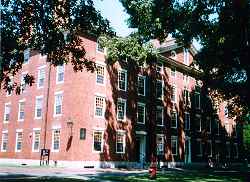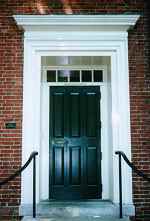Home | News | Books | Speeches | Places | Resources | Education | Timelines | Index | Search
Hollis Hall
© Abraham Lincoln Online
Stoughton Hall
© Abraham Lincoln OnlineRobert Todd Lincoln at Harvard College
In 1859 when Abraham and Mary Lincoln's eldest son arrived in Cambridge, Massachusetts, he was surprised and disappointed. Robert Todd Lincoln hoped to be admitted to Harvard College but failed all the entrance examinations. To correct this, he spent a year at Phillips Exeter Academy, the famous college prep school in nearby Exeter, New Hampshire.There is no record of what his father told him at the time, but one year later Robert began classes at Harvard. A hint of his father's thinking exists in a letter to Robert's friend George Latham, who also failed the examinations in 1860. Abraham Lincoln wrote, "It is a certain truth, that you can enter, and graduate in, Harvard University; and having made the attempt, you must succeed in it."
Abraham Lincoln, who had little formal education, evidently wanted a different experience for his son. In an 1860 campaign autobiography, he wrote in the third person, "Abraham now thinks that the aggregate of all his schooling did not amount to one year. He was never in a college or academy as a student, and never inside of a college or academy building till since he had a law license. What he has in the way of education he has picked up. After he was twenty-three and had separated from his father, he studied English grammar--imperfectly, of course, but so as to speak and write as well as he now does. He studied and nearly mastered the six books of Euclid since he was a member of Congress. He regrets his want of education, and does what he can to supply the want."
The President's Son on Campus
When Robert returned to Cambridge in the fall of 1860, the student body was predominantly Republican and his father was the Republican candidate for President. After his father won the election, a November 16 New York Times article noted that Robert had "within the past week, grown vastly in popularity with his fellow students and the townspeople generally. On Wednesday night, in a body, the students called upon him, congratulated him upon the success of his father and the jolly state of affairs in the country generally."
Students from Southern states, however, did not have such a sanguine view of the election, and most left the school during the winter vacation of 1860-61. Robert used his winter break to return to Springfield, Illinois, where he joined his father on the inaugural journey to Washington.
Robert studied the standard curriculum of his time, as there were no college "majors" then, taking classes in botany, chemistry, composition, declamations, elocution, forensics, Greek, history, mathematics, philosophy, physics, political economy, religion, rhetoric, and themes. As an upperclassman he was allowed a few electives, and he chose French and Italian. Years later he recalled James Russell Lowell, one of his teachers: "when now I take up my Dante, Mr. Lowell seems to be with me." In his Class Book of 1864, he observed, "My life in College has been very pleasant and has had no interruptions. I have studied enough to satisfy myself without being a 'dig.'"
For three years, Robert lived on campus in buildings which still serve as dormitories. He spent his sophomore and junior years in Room 22 of Stoughton Hall, named for William Stoughton, class of 1650. In 1698 Stoughton became the first person to give a building to an American college. In 1805 that building was replaced by one designed by Charles Bulfinch, the celebrated Boston architect. Robert participated in Hasty Pudding Club theatricals which were performed on the top floor of Stoughton. He served the club as vice president during the first term of his senior year. His memories of the club must have been pleasant, because he kept a photograph of himself and other members at Hildene, his summer home in Vermont.
Stoughton had the distinction of being partly funded by a state lottery. After the Revolutionary War, the growing student body necessitated additional housing. In 1793 the college board received permission to raise monies for a new dormitory through a lottery, the second time the college used this fund-raising method to provide building revenue.
During his senior year, Robert lived in Room 25 of Hollis Hall, a companion building next to Stoughton Hall. Although the two brick dormitories appear to be identical, a close study reveals their architectural differences. Hollis was dedicated on January 13, 1764, about 100 years before Robert moved in. It honors Thomas Hollis of London, part of a family which supported the college for many years. During the Revolutionary War it housed Colonial troops in 1775-76.
President Lincoln, absorbed by the heavy demands of his position, did not visit his son at Harvard; instead, Robert saw his family during school vacations in Washington and other locations. His mother visited him in Boston twice in 1861, coming in May and November. In 1862 Robert was called from his studies to the bedside of his younger brother William, who died in the White House on February 20. A few days later, Harvard President Cornelius Felton died, and was succeeded by Thomas Hill.
After Graduation
Robert was graduated with the Class of 1864 but as he noted in a July 18 letter, "The President will not be at Commencement." The July 20 festivities included the principal address given by Edward Everett. He was a past president of Harvard and had given the main speech at the Gettysburg cemetery dedication the previous year. He famously complimented President Lincoln on his remarks, now known as the Gettysburg Address.
After a vacation, Robert returned to campus in September to attend Harvard Law School, following in his father's vocation. The school was not highly regarded at the time (it was called "a disgrace to the Commonwealth of Massachusetts" by the American Law Review in 1870), and it is not known if its perceived shortcomings affected Robert's decision to drop out. During his brief stay, Robert argued moot court cases with students like Oliver Wendell Holmes, Jr., the thrice-wounded Civil War veteran and future U.S. Supreme Court jurist.
Robert left law school after his first semester and joined the staff of General Ulysses Grant as a captain. While in college, he was under public pressure to enter the Union Army, but apparently also had a genuine desire to enlist. His Aunt Emilie recalled overhearing his mother tell President Lincoln, "I know that Robert's plea to go into the Army is manly and noble and I want him to go, but oh! I am so frightened he may never come back to us!"
On January 19, 1865, President Lincoln wrote to Grant, asking him to find a safe staff appointment for Robert: "My son, now in his twenty-second year, having graduated at Harvard, wishes to see something of the war before it ends. I do not wish to put him in the ranks, nor yet to give him a commission, to which those who have already served long, are better entitled, and better qualified to hold."
Harvard and the Civil War
Artemus Ward, one of President Lincoln's favorite humorous writers, claimed that during the war Harvard was "located at the Parker House bar," referring to a popular Boston hotel. The school's seeming lack of involvement in the conflict was noted by Samuel Eliot Morison, who wrote, "College life went on much as usual, and with scarcely diminished attendance. Public opinion in the North did not require students to take up arms, as in the World War; there was no mass movement into the army or navy, and draftees who hired a substitute were not despised."
However, more than 1,500 Harvard students and alumni enlisted in military service: 1,311 with the Union forces and 257 with the Confederate. If there had been relative indifference to the war, it quickly disappeared after peace came in 1865. In just three years, alumni raised $370,000 -- an enormous sum for the times -- to memorialize the 136 Harvard men who died in the Union cause. Robert was one of the contributors to the building in 1866.
By 1870 the cornerstone was laid for an impressive Memorial Hall building, where the names of the fallen appear in the memorial transcept. Among them are some of Robert's classmates and Paul Revere's grandson, who died at Gettysburg on July 4, 1863. A portrait of President Lincoln hangs on the north wall. Unlike General Grant he was not awarded an honorary degree from the college. Robert, however, received an L.L.D. on June 23, 1893.
Hollis Hall Entry
© Abraham Lincoln OnlineVisiting Information If you walk through the Harvard campus, you will see several buildings familiar to Robert Todd Lincoln in the Old Yard. The dormitories he lived in remain in the Yard, but are not open for tours. They stand near Massachusetts Avenue, opposite the statue of John Harvard by Daniel Chester French of Lincoln Memorial fame.
Free student-led campus tours go past Robert's dormitories and into Memorial Hall, but don't expect the guide to mention the Lincolns. Tours leave from the Smith Campus Center, 30 Dunster Street. For tour times, click the link below or call 617/495-1573. Cambridge parking is notoriously scarce but the Boston subway Red Line serves the Harvard Square stop.
Related Links
Harvard University
Harvard Campus Tours
Harvard's Memorial Hall
Hildene Family Home
Robert Todd Lincoln Timeline
Robert Todd Lincoln TombRelated Reading
Emerson, Jason. Giant in the Shadows: The Life of Robert T. Lincoln. Carbondale: Southern Illinois University Press, 2012.
Goff, John S. Robert Todd Lincoln: A Man in His Own Right. University of Oklahoma Press, 1968.
Morison, Samuel Elliot. Three Centuries of Harvard, 1636-1936. Cambridge: Harvard University Press, 1936.
Home | News | Education | Timelines | Places | Resources | Books | Speeches | Index | Search Text and photos copyright © 2019 Abraham Lincoln Online. All rights reserved. Privacy Policy



